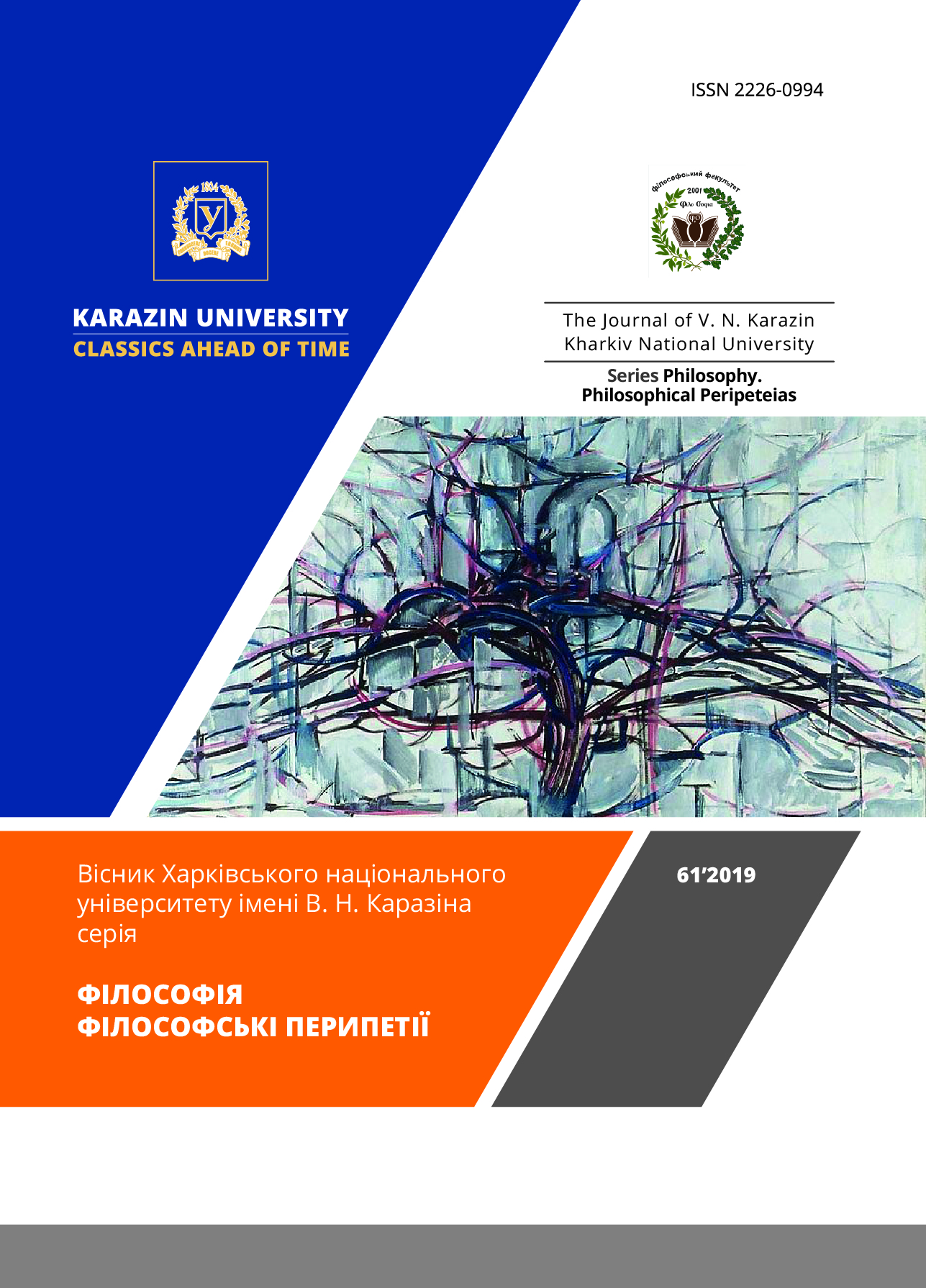ETHICAL VIEWS OF TOTALITARIANISM IN HANNAH ARENDT’S POLITICAL PHILOSOPHY
Abstract
The article analyzes the ethical studies of Hannah Arendt on the origin of totalitarianism. The author considers the conditions for the formation of a “total state” and the role in these processes of both society as a whole and an individual. Based on the works of Hannah Arendt, the author analyzes the features of the totalitarian transformations of the individual and society, as well as their interaction with the regime at different stages of the functioning of the “total state”. According to Hannah Arendt, totalitarianism is a system of mass terror, which is a phenomenon of the twentieth century. Totalitarianism is realized in the conditions of the destruction of political space and human interaction. It is the result of the alienation of a person from political life, that is, the “atomization” of society against the background of a deformation of basic ethical standards and established ideas about morality in general. Considering the problem of the emergence of totalitarianism, Arendt turns to the anthropological plane, where she explores the way in which violence enters the public sphere, and politics turns into an instrument for achieving certain goals and serving private interests. Hannah Arendt also analyzes the phenomenon of the “banality of evil,” which lies at the base of the so-called “respectable society”. Such a society easily becomes a weapon of totalitarianism along with “grassroots executors of orders”, as the example of Adolf Eichmann demonstrates. Hannah Arendt believes that the actions of such “executors of orders” should always be assessed as the actions of a person, and not just a “social tool”, from which responsibility for crimes is thus removed. Hannah Arendt identifies various areas of ethical (namely, areas of individual and public morality), where there is a division into personal and political responsibility, and also studies the problems of preventing a possible repetition of totalitarianism. The “means” for such prevention, according to Hannah Arendt, are on an ethical plane. This is, firstly, the possibility of independent judgment and critical thinking, which create personal principles. And secondly, the presence of a public sphere, which provides the possibility of free action in a common social space. This is what actualizes moral issues and ensures the formation of moral principles.
Downloads
References
/References
Adorno, T. (2012). The Authoritarian Personality. (M. Popov, Trans.). Moscow: AST. (Original work published 1950). (In Russian).
Arendt, H. (1996). The Origins of Totalitarianism. (L. Sedova, Trans.). Moscow: CentrCom. (Original work published 1951). (In Russian).
Arendt, H. (2008). Eichmann in Jerusalem: A Report on the Banality of Evil. (S. Kastalskii & N. Rudnytskaia, Trans.). Moscow: Europe. (Original work published 1963). (In Russian).
Bernstein, R. (1996). Hannah Arendt and the Jewish Question. Massachusetts: MIT Press.
Hayek, F. А. (2010). The Road to Serfdom. (M. Gnesdovskiy, Trans.). Moscow: AST. (Original work published 1944). (In Russian).
Malyshev, A. M. (2010). The Concept of Totalitarianism in the Works of Hannah Arendt. Scientific Journal of the Institute of Philosophy and Law of the Russian Academy of Sciences, 10, 297–327. (In Russian).
Popper, K. (1994). The Open Society and its Enemies. (O. Kovalenko & O. Butsenko, Trans.). Kyiv: Osnova. (Original work published 1945). (In Ukranian).
Schmitt, K. (1992). The Concept of the Political. (A. F. Filippov, Trans.). Voprosy Sociologii – Sociological Issues, 1, 37–67. (Original work published 1932). (In Russian).
Stewart, A. (2001). Theories of Power and Domination: The Politics of Empowerment in Late Modernity. Thousand Oaks, California: SAGE Publications Ltd.
Žižek, S. (1999). The Sublime Object of Ideology. (V. Sofronov, Trans.). Moscow: Khudozhestvennyy zhurnal. (Original work published 1989). (In Russian).
Адорно Т. Исследование авторитарной личности / пер. с нем. М. Попов, М. Кондратенко. М.: АСТ, 2012. 480 с.
Арендт Х. Банальность зла. Эйхман в Иерусалиме / пер. с англ. С. Кастальский, Н. Рудницкая. М.: Европа, 2008. 424 с.
Арендт Х. Истоки тоталитаризма / пер. с англ. Л. Седов. М.: ЦентрКом, 1996. 704 с.
Жижек С. Возвышенный объект идеологии / пер. с англ. В. Софронов. М.: Художественный журнал, 1999. 234 с.
Малышев А. М. Концепция тоталитаризма в творчестве Ханны Арендт. Научный журнал Института философии и права Российской Академии наук. 2010. Вип. 10. С. 297–327.
Поппер К. Відкрите суспільство та його вороги / пер. з англ. О. Коваленко, О. Буценко. К.: Основа, 1994. 495 с.
Хайек Ф. фон. Дорога к рабству / пер. с англ. М. Гнедовский. М.: АСТ, 2010. 320 с.
Шмитт К. Понятие политического / пер. с нем. А. Ф. Филиппов. Вопросы социологии. 1992. № 1. С. 37–67.
Bernstein R. Hannah Arendt and the Jewish Question. Massachusetts: MIT Press, 1996. 256 p.
Stewart A. Theories of Power and Domination: The Politics of Empowerment in Late Modernity. California: SAGA, 2001. 270 р.
Authors who publish with this journal agree to the following terms:
- Authors retain copyright and grant the journal right of first publication of this work under the terms of a license Creative Commons Attribution License 4.0 International (CC BY 4.0).
- Authors are able to enter into separate, additional contractual arrangements for the non-exclusive distribution of the journal's published version of the work (e.g., post it to an institutional repository or publish it in a book), with an acknowledgement of its initial publication in this journal.
- Authors are permitted and encouraged to post their work online (e.g., in institutional repositories or on their website) prior to and during the submission process, as it can lead to productive exchanges, as well as earlier and greater citation of published work.






3.gif)




